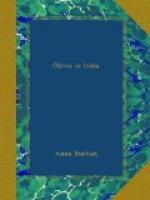We landed at Port Said yesterday morning. People told us it was a dirty place, an uninteresting place, a horribly dull place, not worth leaving the ship to see, but it was our first glimpse of the East and we were enchanted. The narrow streets, the white domes and minarets against the blue sky, the flat roofs of the houses, the queer shops with the Arabs shouting to draw attention to their wares, and, above all, the new strange smell of the East, were, to us, wonderful and fascinating.
When we got ashore the sun was shining with a directness hitherto unknown to us, making the backs of our unprotected heads feel somewhat insecure, so we went first to a shop where we spied exposed to sale a rich profusion of topis. In case you don’t know, a topi is a sun-hat, a white thing, large and saucer-like, lined with green, with cork about it somewhere, rather suggestive of a lifebelt; horribly unbecoming but quite necessary.
A very polite man bowed us inside, and we proceeded on our quixotic search for a topi not entirely hideous. Half an hour later we came out of the shop, the shopman more obsequious than ever, not only wearing topis, but laden with boxes of Turkish Delight, ostrich-feather fans, tinsel scarves, and a string of pink beads which he swore were coral, but I greatly doubt it. We had an uneasy feeling as we bought the things that perhaps we were foolish virgins, but before the afternoon was very old we were sure of it. You wouldn’t believe how heavy Turkish Delight becomes when you carry half a dozen boxes for some hours under a blazing sun, and I had a carved book-rest under one arm, and G. had four parcels and a green umbrella. To complete our disgust, after weltering under our purchases for some time we saw in a shop exactly the same things much cheaper. G. pointed a wrathful finger, letting two parcels fall to do it. “Look at that,” she said. “I’m going straight back to tell the man he’s cheated us.” With difficulty I persuaded her it wasn’t worth while, and tired and dusty we sank—no, we didn’t sink, they were iron chairs—we sat down hard on chairs outside a big hotel and demanded tea immediately. Some of the ship people were also having tea at little tables, and a party of evil-looking Frenchmen were twanging guitars and singing sentimental songs for pennies. While we were waiting a man—an Arab, I think—crouched beside us and begged us to let him read our hands for half a crown, and we were weak enough to permit it. You may be interested to know that I am to be married “soon already” to a high official with gold in his teeth. It sounds ideal. G. was rather awed by the varied career he sketched for her. After tea, which was long in coming and when it came disappointing, we had still some time, so we hailed a man driving a depressed-looking horse attached to a carriage of sorts, and told him to drive us all round. He looked a very wicked man, but it may have been the effect of his only having one eye, for he certainly had a refined taste in sights. When we suggested that we would like to see the Arab bazaar he shook his head violently, and instead drove us along dull roads, stopping now and again to wave a vague whip towards some building, remarking in most melancholy tones as he did so, “The English Church”—“The American Mission.”




